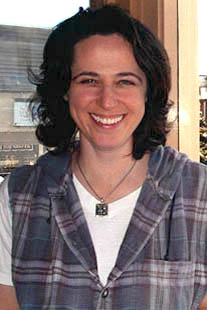
Wendy Katz, associate professor of art history, has received a 2013 Smithsonian Senior Fellowship. She will use the award to conduct research in Washington, D.C., from January to April 2014.
The fellowships are offered by the Smithsonian Institution to provide opportunities for senior investigators to conduct research in association with staff members at the Smithsonian Museums.
Katz is researching a new book, “The Politics of Art Criticism in the Penny Press, 1833-1861.” She intends to conduct research at the American Art Museum, the National Portrait Gallery and the National Museum of American History at the Smithsonian, as well as at the Library of Congress.
“I’m really excited,” Katz said. “The Smithsonian, because it focuses on American art and American history, offers historians, librarians and curators who have a wealth of knowledge and materials in exactly the area I study. It will be such a rich environment to work in.”
Katz is examining art criticism during the antebellum period in the penny press and other periodicals of the time to see how their political and economic agendas influenced their point of view.
“The art criticism of this period just seems chaotic. It doesn’t seem to follow professional guidelines or have a coherent doctrine,” Katz said. “So what I suggest gives it coherence is the fact that these people, who all knew each other, were engaged in competition -- political and literary.”
The penny press papers relied on advertising instead of subscriptions to sell newspapers. To boost sales, Katz said the publications followed English papers and adopted a sensationalist approach to news and art.
“So, for example, one editor, when he’s writing about William Sidney Mount, is really writing about another editor and his art reviewer at another paper,” Katz said. “They’re trying to create controversy between each other, so these papers and portraits help recreate that social network.”
Katz said it’s really not unlike what we see today.
“Today we are so conscious that when we turn on one news channel or another that, often time, that particular commentator has a political agenda,” Katz said. “But we tend to treat records from the past as if that were not true — as if commentary on art is just commentary on art. It seems to me that the 1830s and 1840s, which was the birth of our modern political system and the party system, that’s when you see the birth of exactly this thing — people using cultural commentary as a part of attracting readers.”
Katz’s principal adviser for the Smithsonian Fellowship will be Eleanor Harvey, chief curator of the American Art Museum. She recently published an exhibition catalog on Civil War Art and also was aware that newspapers were not necessarily neutral.
“She was conscious that when the New York Times is writing about Winslow Homer or another artist, that it’s motivated criticism. If they like a picture, it’s at least in part because the representation of African Americans fits a northern view of African Americans, so she was supportive of this project,” Katz said.
For Katz, the best part of the Fellowship is the time it allows her to conduct research.
“The time to do it is the most valuable part,” Katz said. “For four months, that will be my job, just to do this research. It’s hugely attractive.”
Katz has taught at UNL since 1998. She was promoted to associate professor in 2005.
She is also working on an anthology, “Visual and Material Culture at the Trans-Mississippi International Exposition of 1898.”
— Kathe Andersen, Fine and Performing Arts